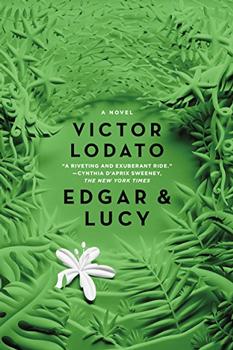Summary | Excerpt | Reading Guide | Reviews | Beyond the Book | Readalikes | Genres & Themes | Author Bio

Now he waited for the Virgin to wink at him, and when she didn't (she never did), he made his way toward the old woman's bed. He was barely touching the earth. On nights like this, gravity had no power over Edgar. The laws were the laws of space: quixotic, effortless, dangerous. One wrong move, one wrong thought, and the world as you knew it would be whisked away, replaced by some grinning immensity. When he finally willed himself down, it was to the floor beside the bed. The thing he liked best was here: a night-light, a small disk of frosted glass, bearing, in delicate relief, the figure of an angel on a bridge. A tiny lightbulb the size of an almond, cleverly concealed behind the glass, brought the scene to life. The angel's dainty foot, toe pointed, hovered just above the bridge. It was a still picture, but Edgar didn't see it that way. He saw movement. He saw the angel descend, he saw her breathe.
Edgar rarely thought about his father when he looked at the angel, even though he knew—but only vaguely, a borrowed memory—that his father had died on a bridge. But that was a long time ago, before Edgar had yet to utter his first word. And so, to the boy, the father remained in the lump and shadow of a half-lived dream. His father was something at the edge of things, but he wasn't a person, exactly. There wasn't enough light behind him to cast his undoing into a satisfactory story. When his mother and grandmother talked about Frank, it was confusing. It was like the two women were talking about an imaginary friend—and there seemed to be some ongoing argument about ownership. Edgar couldn't participate in the game; he had no credentials, no leverage. It was infuriating.
In private, alone with her son, Lucy never mentioned Frank. The grandmother, on the other hand, was less cooperative. Sometimes she cornered the boy and spoke, in theatrical whispers, about her dead son. It was like a fairy tale. Frankie, she called him, sometimes Francesco—often with a cockeyed expression on her face. At such moments, Edgar wondered if his grandmother was a little dim, or possibly she was mad. "When he was your age," she would say, or, "When your father was little…" It made Edgar dizzy. It was like the old woman was playing with a time machine—and, even worse, she was trying to tempt Edgar inside. But Edgar didn't want to go with her to where this other boy lived, this fairy-tale boy who was supposedly his father: a lump, a limp body on a dark road the old woman was trying to flood with light.
"Uh-huh," Edgar would say. "Can I go outside?"
He didn't like to think about that stuff.
But now, as he sat before the night-light, he found himself wondering: what was the point of an angel on a bridge unless she was there to save you? Otherwise, she was just holding up traffic.
The old woman stirred in bed, but didn't wake. Edgar turned and watched her breathe. He could have easily climbed under the covers with her (she never minded), but, instead, he floated over to the bureau and opened the top drawer. Don't creak, he prayed, glancing at the Virgin for support. The top drawer was skinnier than the rest, like the pencil drawer in a desk, and it was filled with cards. Prayer cards. Small laminated rectangles, each with a flashy saint on one side, and, on the other, a name, some dates, and a prayer. They were all dead people! And though his grandmother was generally a very neat person, the cards in the drawer were a helter-skelter mess, as if she'd been playing a game of Go Fish. Edgar joined in the fun and shuffled them a bit, before picking one at random and slipping it into his pocket. Why? No reason. The drunkenness of not sleeping when you should be sleeping. It was his first theft.
After that, there was no stopping him. His eyes went straight to the bottle of Chanel Nº 5. He loved its solid shape, the heavy glass stopper, the simple lettering, black on white. It could have said Arsenic or Sulfur, it belonged in a laboratory, or a storybook; it could have said DRINK ME. His grandmother had had it forever. It was ancient. Edgar knew this was something special. The amber liquid inside the hollow ice cube came from a source that no longer existed. It had to be preserved, which is why, he supposed, his grandmother never used it. For as long as he could remember, the bottle had remained half full. The level never varied. Still, half full meant half empty, which meant his grandmother had been less careful in the past, more certain things would last.
Excerpted from Edgar and Lucy by Victor Lodato. Copyright © 2017 by Victor Lodato. Excerpted by permission of St. Martin's Press. All rights reserved. No part of this excerpt may be reproduced or reprinted without permission in writing from the publisher.
Your guide toexceptional books
BookBrowse seeks out and recommends the best in contemporary fiction and nonfiction—books that not only engage and entertain but also deepen our understanding of ourselves and the world around us.